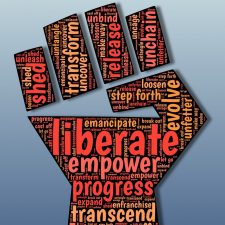 “Sin, for Christ Jesus and His written Word, is an offence against God. Sin that brings all evil and catastrophe upon man is personal sin, and that must be repented of. Christ Jesus clearly taught that one must repent and believe the Gospel. Christ Jesus did not differentiate those who were oppressed or who had suffered, from all other types of people, all must repent and believe. Christ Jesus’ message to you and to me is “except ye repent, ye shall all likewise perish” His message is to repent of our personal sinfulness, to repent of looking to any theology or church for salvation, and to look to Him alone.”
“Sin, for Christ Jesus and His written Word, is an offence against God. Sin that brings all evil and catastrophe upon man is personal sin, and that must be repented of. Christ Jesus clearly taught that one must repent and believe the Gospel. Christ Jesus did not differentiate those who were oppressed or who had suffered, from all other types of people, all must repent and believe. Christ Jesus’ message to you and to me is “except ye repent, ye shall all likewise perish” His message is to repent of our personal sinfulness, to repent of looking to any theology or church for salvation, and to look to Him alone.”
(Richard Bennett – Berean Beacon) Latin American liberation theology has for the most part been a movement identified with the Roman Catholic Church. It is in fact just the tip of the iceberg; the principles that it proclaims have affected western society. Much of the present welfare societies in the USA and in Europe are just different expressions of the same Catholic mentality seen in official statements of the Vatican.[1] …
The Politics of guilt and shame permeate our society. The Catholic Priests, Leonardo Boff and Clodovis Boff, in Introducing Liberation Theology give a sample taste of what is proposed by Liberation theology.
“Every true theology springs from a spirituality – that is, from a true meeting with God in history. Liberation theology was born when faith confronted the injustice done to the poor. By ‘poor’ we do not really mean the poor individual who knocks on the door asking for alms. We mean a collective poor, the ‘popular classes,’ which is a much wider category than the ‘proletariat’ singled out by Karl Marx (it is a mistake to identify the poor of liberation theology with the proletariat, though many of its critics do): the poor are also the workers exploited by the capitalist system; the underemployed, those pushed aside by the production process – a reserve army always at hand to take the place of the employed; they are the laborers of the countryside, and migrant workers with only seasonal work.”[2]
Then in the chapter called “Claiming the Promised Land: A New Jubilee for a New World” they state,
“‘The profit of the earth is for all’ (Eccles. 5:9). The Old Testament ethic, to assure everyone the same natural opportunity, asserts that all people have an equal right to economic rent…”[3]
Liberation theology perhaps is the most visible form of a wide-ranging Roman Catholic social thought. As such, it serves as a window into the Economic and Political strategy of the Vatican that pervades Western society. It is quite informative to read the “A Concise History of Liberation Theology” by Leonardo and Clodovis Boff. In the last paragraph they state,
“The general tenor of the pronouncements of the magisterium, whether papal or coming from the Synod of Bishops, has been to recognize the positive aspects of liberation theology, especially with reference to the poor and the need for their liberation, as forming put of the universal heritage of Christian commitment to history.”[4]
Research: